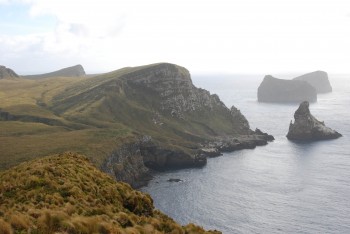Despite a winter campaign with intermittent poor weather the Million Dollar Mouse project successfully completed the second aerial drop of poison bait on New Zealand’s Antipodes Island on 12 July – just in time before a major storm hit the island two days later. The field team is now focusing on species monitoring and packing up the infrastructure, ready for its departure to the mainland this month.
Lou Sanson, Director-General of the New Zealand Department of Conservation, stated recently in his regular blog: “With three helicopters, 13 staff, 65 tonnes of brodifacoum, 30 tonnes of fuel and two ships, this is one of the most complex jobs we have taken on recently, on one of New Zealand’s most isolated islands.” After a wait of two years monitoring will be undertaken to see if the campaign was successful and the Antipodes are mouse free.

Antipodes Island, photograph by Erica Sommer

Antipodean Albatrosses on the Antipodes, photograph by Erica Sommer
Read past news on the Million Dollar Mouse project here.
To read of progress with plans to eradicate House Mice on Gough Island in the South Atlantic click here and here.
John Cooper, ACAP Information Officer, 26 July 2016

 English
English  Français
Français  Español
Español